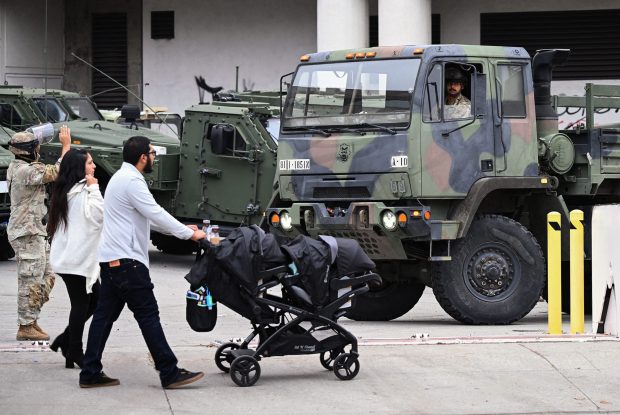On the weekend before Christmas, when you might expect a Chicago mayor to be riding a snowplow or be out shopping or eating in the Loop, kids and cameras in tow, all hearty good cheer and exhortations for Chicagoans to please spend their holiday money in Chicago, Brandon Johnson was avoiding questions about why he plotted to fire the head of Chicago Public Schools on the last day of school before holiday break and during Shabbat.
As if the children of the Jews who have built so much of and in Chicago were merely an afterthought. Or an impediment to a preplanned agenda.
Instead of just shaking kids’ hands on their way out the door and telling them to enjoy their break and love their families and read some good books, Johnson was no doubt quietly worrying over how his planned firing of those kids’ leader, CPS CEO Pedro Martinez, would pan out. He’d already turned Martinez, the man he saw as being in the way of his Chicago Teachers Union friends’ pay raises, into the most unlikely of local media celebrities, raising his profile and boosting his support even as so many of Johnson’s own supporters scurried away as the end of the mayor’s year became swallowed by the most isolating of stories. Eve-of-Christmas firings hardly are uncommon in the corporate world as struggling companies cut costs and hope to start anew. But a school district is not a business. It’s a mission.
The firing was dramatic; many hundreds of watchers toggled back and forth between a school board livestream and a college football playoff game. Stories were rushed out as holiday feel-good narratives were dropped from the newscasts. This was how Chicago’s mayor had his city start its season of goodwill.
Reporters and commentators huffed and puffed on X, formerly Twitter. Potential mayoral challengers hit send on opinion pieces. Newly elected school board members pointed out the affront to democracy. Former progressive allies, some with wise, old heads, either stood up against Johnson’s actions or looked away and let their silence and disappointment speak for them. All but the most hysterical knew that Johnson’s election was the will of the people, and that it should not be subverted because of poor decision-making. But that did not mean the city’s trajectory had to be admired.
On that same weekend, news filtered out about many senior staffers departing, voluntarily or otherwise, from City Hall.
Our jobs are far from everything in our lives, and the mayor has his own family. Still, he’s never looked more alone in a season when that’s the last thing most of us want. Especially politicians.
That same week before Christmas, politically inclined businessman Willie Wilson was at Cook County Jail with a bunch of pastors, encouraging the incarcerated to find a new path, make better choices and never return once they are released. He offered up both financial resources and his personal contact information for job seekers, raining hundred-dollar bills on their strapped and stressed family members, listening to bright-eyed little kids sing “Jingle Bells” in a place not known for fun — a very rich man giving back, one envelope at a time, and gaining his own rewards in the process.
“If I can do this with a seventh-grade education,” he said to the nodding detainees, “so can you.” “Take hope from the Christmas story and its promises of light and the possibility of redemption,” the pastors said. When we are born we look like our parents, but when we die we look like the decisions we made.
Demonstrably, the detainees took a lot from Wilson and the pastors. But then Wilson and the pastors also got a lot out of the detainees.
In his December forum on democracy, held in Chicago’s South Loop, former President Barack Obama said, “Pluralism is not about holding hands and singing kumbaya. It is not about abandoning your convictions and folding when things get tough; it is about recognizing that in a democracy, power comes from forging alliances and building coalitions.”
Johnson’s isolation is born of a political crusade, sincerely followed. His evident belief is that established, racist structures — like a school system, to name but one example — must be blown up for real, equitable change to occur, that reapportioning a city’s resources is far more important than growing its whole, that the more the political world changes outside Chicago’s borders, the more it is essential for him to double down on his immutable quest. Such zealotry isn’t confined to the far left; much the same behavior can be seen on the other end of the political spectrum.
But, of course, ideological purity is impossible to maintain when you’re the one in charge. Reality intrudes — in the form of external crises, financial restraints, political roadblocks, and subsequent elections that demonstrate that your ideology isn’t popular when put into practice. Seeing and decrying enemies at every turn inevitably hardens those opponents against you. Allowing yourself to become a polarizing figure increases polarization all around you. Once the show goes wrong, no one wants to be caught in the rush for the exits.
The message of Christmas, of course, is that’s it never too late to chart a different path. And, yes, that a willingness to forgive helps all of us. The climax of “A Christmas Carol” has nothing to do with ghosts; it comes when Ebenezer Scrooge agrees to show up for dinner at the home of his niece, after declining her invitations for years.
So much better than dining alone.
Submit a letter, of no more than 400 words, to the editor here or email letters@chicagotribune.com.



